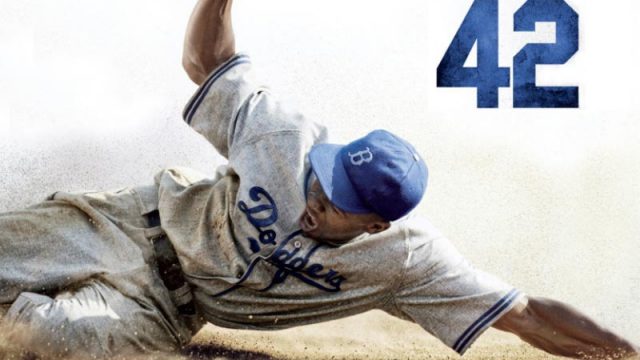Movie Review: How Capitalism Ended Racial Segregation In Baseball

Last night my wife and I went to see 42, the Jackie Robinson story. It was an enjoyable enough movie (as they said in Moneyball
, it’s hard not to be romantic about baseball), though the story was more fairy tale than reality.
But what do you expect when a movie about real people doing things that actually happens starts with a warning like “Based on true events.” It wouldn’t be Hollywood without some embellishment.
The movie was formulaic sports drama fare, complete with the de rigeur melodrama and dominated by Harrison Ford’s ham-handed caricature of baseball icon Branch Rickey, but it is redeemed thoroughly by the subject matter. No matter how cheesy the portrayal, you can’t help but admire who Jackie Robinson was and what he accomplished.
Yet, something else came shining through in the movie, and I wasn’t expecting it. You see, it wasn’t good will that ended segregation in baseball. It was capitalism, and the film touches on that theme repeatedly.
In the beginning of the film, as Branch Rickey is informing his underlings of his desire to integrate the Brooklyn Dodgers, he responds to their inquiries about his motivations by saying “baseball fans are black and white” but that “all the money is green.”
His intent in bringing in a black player – at this point in the story he doesn’t know it will be Robinson – is to make his team better, win more games and attract more paying customers to his games.
This reasoning is repeated again and again throughout the film.
When Robinson, showing up for his first tryout with the International League’s Montreal Royals, is asked why he’s making the attempt to break baseball’s color barrier he tells them, “I’m doing it for the the money.”
To be sure, the integration of Major League Baseball was a complicated issue. It wouldn’t be fair to say that capitalism was the only motivating factor. Whites serving with blacks in World War II did a lot to change public attitudes about racial segregation, and leaders like Rickey and Commissioner Happy Chandler were without a doubt motivated by a sense of serving justice.
But it would be a mistake to ignore the driving force of capitalism pushing the issue forward. Before the integration of baseball, the various Negro league baseball teams were drawing big talent and big crowds. Their organized leagues, and barnstorming teams, were competition for the majors. Eventually, it just became bad business to keep black players out of the majors.
The Brooklyn Dodgers, and every other whites-only baseball team were poorer for excluding blacks from their pool of potential player. By integrating, the Dodgers and eventually every other team in the majors became better. Better teams made professional baseball a better product for fans (even if some of them didn’t like it a first).
In the end, it all meant more money for baseball.
And it’s no coincidence that the integration of the majors spelled the end for the Negro leagues. As the best players left to play in the majors, the leagues folded. Those leagues had been serving a black market (a literal black market) for baseball created by the embargo of black players in the majors. But once the segregation ended, there was no more market for the Negro leagues.
With a flood of black players following Jackie Robinson, Roy Campanella and Don Newcombe into the majors, the Negro National League folded in 1948 (the year after Robinson’s rookie season). The Negro American League managed to stagger almost to the 1960’s before folding as well.
The lesson in this is that there is an economic cost for discrimination. Whether we’re talking about a baseball team or a business, if you exclude qualified people because of something other than their merits and abilities, you’re hurting yourself. You’re costing yourself money. The best way to maximize profits is to reward those with the best skills without regard for race, gender, etc, etc.
Which, in turn, means that the most powerful tool against racism and sexism and any other sort of bigotry is the free market.
In the political world, we’re often told that the only way to stop discrimination is through government policy. Laws creating protected classes, and regulations requiring hiring and admissions quotas. But the legacy of Jackie Robinson isn’t one of affirmative action or protected classes. Robinson’s legacy is one of hard work and talent breaking through a barrier put up by hatred and ignorance.
Robinson wasn’t in the majors because someone decided to impose some arbitrary notion of diversity. Robinson broke through into the majors because he deserved to be there, and so did those who came behind him.
It’s a story worth remembering in this era of entitlement and victimhood.







